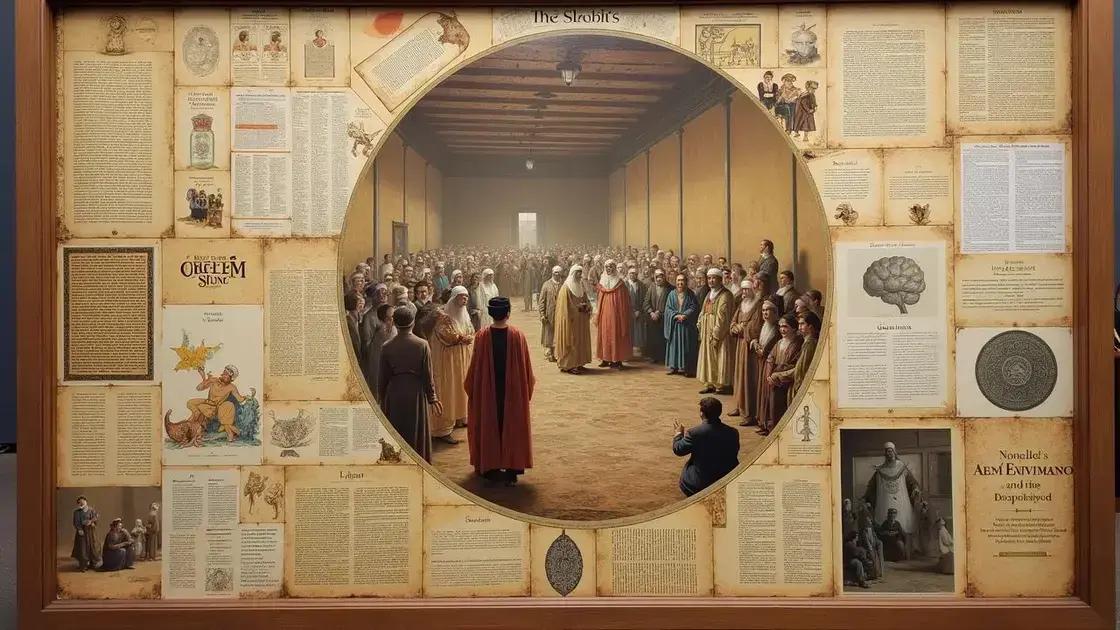The Sheikh’s Trick is a traditional storytelling method in Arab culture that combines cleverness and moral lessons, fostering community bonds while answering critiques about its relevance and depth in contemporary society.
The question, Is the Arab Sheikh’s Trick backed by cultural evidence?, intrigues many who seek to understand the interplay between tradition and belief systems. This article delves into the fascinating aspects of this topic, exploring historical, cultural, and social dimensions. We will examine the origins of the Sheikh’s trick, review cultural attitudes, and analyze empirical evidence that either supports or contradicts this claim. Join us as we unravel this complex narrative and consider various perspectives on a practice that continues to captivate minds.
Understanding the Arab Sheikh’s Trick

Understanding the Arab Sheikh’s Trick requires delving into its origins and significance within the culture. Traditionally, this trick represents cleverness and wit, taking many forms. It often includes elements of surprise, deceit, or simple illusion, captivating audiences and demonstrating the Sheikh’s intelligence. Central to the practice is the concept of storytelling, where the trick acts as a narrative device, engaging listeners and teaching valuable lessons.
Origins of the Trick
The origins of the Sheikh’s Trick can be traced back to ancient times. It has roots in folklore and serves as a reflection of societal values. Often, these tricks carry moral lessons, highlighting virtues like patience, intelligence, and resourcefulness. In various Arab cultures, such tricks are used during gatherings to entertain and enlighten.
Types of Tricks
There are many variations of the Sheikh’s Trick. Some involve sleight of hand, while others are based on clever wordplay or riddles. The trickster, usually portrayed as a wise old Sheikh, showcases his ability to outsmart others, often to teach a lesson. This reflects a deep cultural appreciation for wit and wisdom in storytelling.
Impact on Culture
The influence of the Sheikh’s Trick goes beyond entertainment. It fosters community bonding by creating shared experiences that encourage laughter and discussion. Additionally, these tricks serve as a medium for preserving cultural heritage, ensuring that traditional stories and morals are passed down through generations. By examining the Sheikh’s Trick, we observe a rich tapestry of cultural values and practices.
Cultural Perspectives on the Sheikh’s Trick

Exploring cultural perspectives on the Sheikh’s Trick reveals how this practice reflects common values in Arab societies. Across many regions, the Sheikh’s Trick embodies cleverness, wisdom, and an understanding of human nature. Cultural narratives often position the Sheikh as a teacher or guide, using tricks to impart moral lessons.
Community and Tradition
The Sheikh’s Trick plays a significant role in community gatherings. It is often shared during festivals, weddings, and storytelling nights. These gatherings reinforce social ties, allowing people to connect through shared laughter and insight. The practice of telling such tricks helps preserve tradition and pass down cultural identity.
Symbolism in the Trick
Symbolically, the Sheikh’s Trick may represent the struggle between appearance and reality. It teaches audiences to question what they see and think critically about situations. This element is crucial in many stories, where the clever protagonist often outsmarts opponents, emphasizing the value of intellect over brute strength.
Gender Perspectives
Gender plays an interesting role in the portrayal of the Sheikh’s Trick, where male Sheikhs are often the tricksters. However, women also participate in these cultural exchanges, using wit to navigate social structures. Understanding these gender dynamics adds depth to the cultural perspectives surrounding the trick and highlights varying roles within traditions.
Empirical Evidence Supporting the Trick

To explore empirical evidence supporting the Sheikh’s Trick, we must examine historical accounts and cultural studies. Researchers have documented many instances of this trick being performed in various regions of the Arab world. These accounts show that the Sheikh’s Trick has been a part of social gatherings for centuries, serving as both entertainment and a tool for imparting wisdom.
Historical Documentation
Historical texts often reference the Sheikh’s Trick as a means to convey moral lessons in a memorable way. Such documentation can be found in the folklore of different Arab cultures, highlighting key stories that involve the Sheikh using wit and intelligence to solve problems. Many of these texts reveal a consistent theme of cleverness that resonates with audiences.
Cultural Studies
In modern cultural studies, anthropologists have observed that the Sheikh’s Trick remains relevant in contemporary society. These studies indicate that the trick continues to foster community bonding and convey traditional values. For example, interviews with community members reveal how these tricks spark conversations and deepen understanding within families and groups.
Psychological Insights
Psychological research also supports the impact of the Sheikh’s Trick on cognitive development. Engaging with such tricks encourages critical thinking and problem-solving skills among audiences. Studies show that storytelling and the use of humor in these tricks help reinforce learning and retention of key lessons while making them enjoyable.
Critiques and Counterarguments

Within the discussion of critiques and counterarguments about the Sheikh’s Trick, several perspectives challenge its cultural significance and validity. Critics argue that while the trick is entertaining, it often oversimplifies complex social dynamics in Arab societies. This perception can reduce rich cultural narratives to mere entertainment, stripping them of their depth.
Oversimplification of Cultural Narratives
One argument is that the Sheikh’s Trick presents a skewed picture of reality. Critics claim that it simplifies the challenges faced by communities. Instead of providing insightful commentary, these tricks may mask deeper societal issues, leading to a misunderstanding of the cultural context.
Lack of Empirical Evidence
Some scholars point out the lack of rigorous empirical research supporting claims about the benefits of the Sheikh’s Trick. While anecdotes and cultural studies exist, they argue that more systematic studies are needed to understand the impact of these tricks on audience behavior and community values. This absence of data raises questions about their actual efficacy in teaching and engaging audiences.
Contemporary Relevance
There are also concerns regarding the contemporary relevance of the Sheikh’s Trick. As societies evolve, critics argue that these traditional tricks may not resonate as strongly with younger generations. They assert that cultural practices should adapt to modern values and techniques to remain meaningful and impactful, suggesting a potential disconnect between older and younger audiences.
Exploring the Cultural Significance of the Sheikh’s Trick
The Sheikh’s Trick stands as a fascinating element of Arab culture, rich in history and significance. Through storytelling and cleverness, it captures the essence of community interactions while providing moral lessons. However, critiques also highlight its limitations and the need for modern relevance.
Understanding both the empirical evidence supporting the Sheikh’s Trick and the counterarguments against it offers a comprehensive view of its role in contemporary society. This exploration not only deepens our appreciation for cultural narratives but also encourages thoughtful dialogue about the evolution of traditions in a changing world.
Ultimately, the Sheikh’s Trick illuminates the complex interplay of wisdom, entertainment, and tradition, inviting us to engage with and reflect upon our shared cultural experiences.
FAQ – Frequently Asked Questions about the Sheikh’s Trick
What is the Sheikh’s Trick?
The Sheikh’s Trick is a traditional form of storytelling that uses cleverness and wit to entertain and impart moral lessons within Arab culture.
How has the Sheikh’s Trick evolved over time?
Historically, the Sheikh’s Trick has adapted through generations, reflecting changes in social dynamics and community values while still retaining its core elements.
What are some common themes in the Sheikh’s Trick?
Common themes include cleverness, morality, and the importance of storytelling, often emphasizing the value of intelligence over brute force.
Are there critiques of the Sheikh’s Trick?
Yes, critiques include concerns about its potential oversimplification of complex social issues and questions about its relevance to modern audiences.
Is there empirical evidence supporting the significance of the Sheikh’s Trick?
While there are historical and cultural studies documenting its importance, some scholars argue that more systematic research is needed to fully understand its impact.
How does the Sheikh’s Trick impact community bonding?
The trick fosters community bonding by engaging audiences in shared experiences, allowing individuals to connect through laughter and storytelling.













